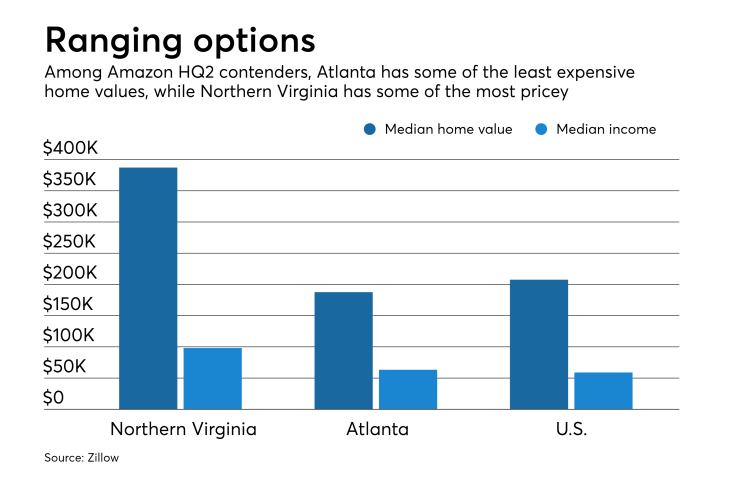After narrowing its search to 20 cities, experts predict Amazon will choose Atlanta or Northern Virginia as its second headquarters, which will have a profound impact on both
Of all
Atlanta has the fourth lowest home values and rents among the finalists, making it an attractive option for the roughly 50,000 workers Amazon plans to hire, Zillow said. Northern Virginia, however, which is part of the Washington, D.C., metropolitan area, is among the most expensive cities on the list, but may seem appealing because of its close proximity to policymakers.
As Amazon grew from a startup bookstore to one of the nation's top retailers,
Amazon's second headquarters will not only bring thousands of high-paying jobs to its new city, but it has the potential to transform the regional economy, according to Zillow Senior Economist Aaron Terrazas. The company's new location should spur demand for all housing types, from urban apartments to single-family homes.

"Atlanta has the benefit of being one of the most affordable markets in the country, and is undergoing an urban renaissance with new public infrastructure providing attractive opportunities for employers seeking to lure young urbanites. Northern Virginia has its benefits as well, as it's close to a highly educated workforce and a well-developed public transit infrastructure in the D.C. area," Terrazas said in a press release.
Many of the contenders for Amazon's HQ2 have offered tax breaks and other benefits to the company, but the cities should be careful what they wish for, as they could be putting their region at risk.
"The potential economic benefits of hosting Amazon HQ2 are tantalizing, and will tempt the 20 municipalities still in the hunt to dangle significant tax incentives to get a deal done," Terry Loebs, founder of Pulsenomics, said in a press release.
"These cities should be prepared not only to justify their financial inducements, but to carefully weigh the social risks and costs that could accompany their HQ2 commitment. The mix and degree of these potential risks, such as diminished affordable housing stock, more congested roadways, and greater income inequality, vary considerably across the 20 markets," he continued.
Housing and economy experts also cited Austin, Texas, Raleigh, N.C., and Denver as possible picks for Amazon's second home. Respondents cited Los Angeles, New York, Miami and Newark, N.J., as least likely to be chosen.





